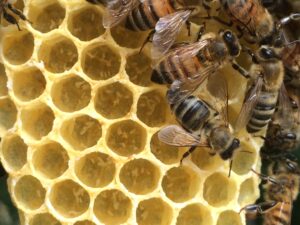Bee season has started in Michigan, but I’m ever-so-attentively managing a single bee—a ba-bee, in Oregon.
Our first grandchild’s parents returned to work in April, and Grandpy and I are totally enthralled with little Thomas. I don’t know how we’ll ever leave him next week, but thank goodness we have bees in Michigan whom we suspect desperately need some attention. (Thanks to our beek friends checking in on them for us.)
When I’m not burping or playing with ba-bee, I love answering emails and texts about honey bees. The second best thing to working bees is thinking about and discussing them. They say most beekeepers are introverts. Sure, until we start discussing bees. Then the only way to quiet us down is to pop in a pacifier.
(Oops, that only works for ba-bees, and then (trust me on this) not all the time.)
Lots of newbees recently got packages and nucs in Michigan. I’ve had lots of start-up questions … and noticed one disturbing trend with conversations that start like “I’ve been in the hive every day since I put them in a week ago, and ….”
Folks, STAY OUT OF THE HIVE! Every time you go in there, you basically take down their internet, among other negative impacts. They communicate largely by scent. You’re interrupting that, and you’re changing the temperature and humidity they’ve worked hard to achieve. They need 91 degrees F. to make wax, and 93 degrees to raise brood. Don’t disrupt that unless you need to do so.
And, there are a few times that you need to do so. They include:
— Releasing the queen / verifying that she’s out (necessary if you bought a package, and do this 3-7 days after you installed them depending upon weather)
— Verifying that the queen is laying properly (about a week after queen release for a package or a nuc install)

A properly laying queen will have one egg placed at the bottom of most cells of the brood area. This photo shows eggs haphazardly placed by laying worker bees; the colony has no future.
— Making sure they have enough room (every week to 10 days during a nectar flow, unless it is a new package. For those of you with packages, when you know the queen is laying appropriately, it will be about a month before you need to add a box, because your colony’s population will decline until about month after you installed it (it takes about a week before the queen starts laying, and 21 days until the first egg she laid turns into an adult bee.)
Please help your bees get off to the best possible start and keep your hive visits minimal and efficient (and your feeders filled.) Like four-month-old grinning ba-bees, honey bees also incredibly intriguing. But unlike babies, they’ll do better if generally left to their own except for purposeful, efficient checks.
Thanks for caring about this awesome insect!

